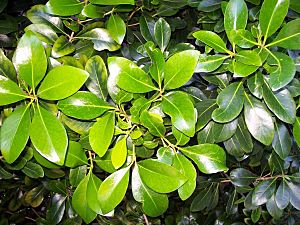Shiny-leaved condoo facts for kids
Quick facts for kids Shiny-leaved condoo |
|
|---|---|
 |
|
| Conservation status | |
| Scientific classification | |
| Genus: |
Pouteria
|
| Species: |
eerwah
|
| Synonyms | |
|
|
The Shiny-leaved Condoo (Pouteria eerwah) is a special and rare tree. It grows in the rainforests of Australia. People also call it the black plum or wild apple. This tree belongs to the Sapotaceae family.
It is found only in a small area of southeastern Queensland. Because it is so rare, it is considered an endangered species. Scientists are still discussing if its name should be Planchonella eerwah.
Contents
Discovering the Shiny-leaved Condoo
This tree was first described in 1894. A scientist named Frederick Manson Bailey gave it the name Sideroxylon eerwah. Later, in 1942, another scientist moved it to its current name, Pouteria eerwah.
The name eerwah comes from Mount Eerwah. This mountain is near Eumundi in Queensland, where the tree grows. Scientists have studied the tree's genes. They found that Pouteria eerwah is closely related to two other trees: Pouteria cotinifolia and Pouteria australis. These three trees form a unique group.
What Does It Look Like?
The Shiny-leaved Condoo can be a tall bush or a small tree. It usually grows about 4 to 10 meters (13 to 33 feet) high. Its trunk has bark that looks scaly.
The leaves are tough and feel like leather. They have veins that stick out, making them easy to spot. These leaves are about 4 to 14 centimeters (1.5 to 5.5 inches) long.
Flowers and Fruit
You can find flowers and fruit on this tree at any time of the year. The flowers are small, about 4 millimeters (0.15 inches) long. They are a creamy-green color and feel a bit hairy.
The fruit changes color as it ripens. It starts dark red-purple and turns black. The fruit is shaped like an oval or a ball. It measures about 3 to 6 centimeters (1 to 2.5 inches) long. Inside each fruit, there are usually three to five seeds.
Where It Lives
The Shiny-leaved Condoo lives in only three places. All of these spots are in southeastern Queensland. It prefers to grow on rocky slopes. You can find it in thick vine areas and rainforests.
In the southern areas, it often grows near other trees. These include hoop pine (Araucaria cunninghamii), Harpullia pendula, and trees from the Flindersia group. In the northern areas, it grows with Argyrodendron species, Atalaya multiflora, Choricarpia subargentea, Excoecaria dallachyana, and Flindersia australis.
Threats to the Tree
The Shiny-leaved Condoo faces several dangers. One big problem is that its home is being taken over by weeds. Some of these harmful weeds include:
- Lantana (Lantana camara)
- Glycine (Neonotonia whitii)
- Corky passionflower (Passiflora suberosa)
- Umbrella tree (Schefflera actinophylla)
Another threat comes from Feral pigs. These wild pigs eat the fruit and seeds of the Shiny-leaved Condoo. This makes it harder for new trees to grow. Protecting this rare tree is important for Australia's rainforests.


